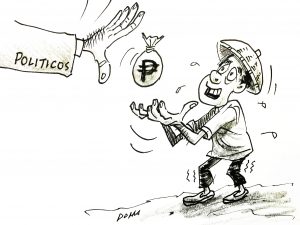The long lines resemble those of refugees, displaced and desperate, but these are not isolated incidents triggered by natural disasters or war. Instead, this has become the unfortunate norm for countless Filipinos who have grown accustomed to living off the charity and generosity of others. They are caught in a vicious cycle of dependency, their hopes tethered to the next handout rather than their own hard work and determination.
The phenomenon is starkly visible among the beneficiaries of the Pantawid Pamilyang Pilipino Program (4Ps). Designed to provide financial assistance to the poorest families, the program has, in many ways, created an unintended dependency. Recipients spend precious hours, even entire days, in queues, waiting for their allowances. The time that could be spent on more productive activities is wasted in anticipation of a small financial lifeline. This dependency is a reflection of a deeper, systemic issue that keeps people from breaking free from the shackles of poverty.
At the heart of this issue lies a political strategy as old as democracy itself: patronage. Lawmakers and politicians, keen to secure their positions, craft laws and ordinances that provide immediate, albeit temporary, relief to the masses. This practice ensures a loyal voter base, indebted to their benefactors for the regular flow of aid. However, this approach breeds complacency and creates a culture of dependency. Instead of empowering people to build sustainable livelihoods, it teaches them to rely on periodic gifts. The electoral advantage gained by politicians comes at the cost of stunted socio-economic development.
Moreover, the dire economic conditions faced by many Filipinos leave them with little choice but to accept these handouts. Poverty is pervasive, and opportunities for self-sufficiency are scarce. Land ownership is a distant dream for many, and employment opportunities are few and far between. The entrepreneurial path is equally fraught, with many lacking the necessary capital to start and sustain a business. In such an environment, relying on government assistance or the generosity of others becomes not just an option but a necessity for survival.
Tragically, some of the aid received is not utilized for essential needs. Instances of relief funds being spent on vices such as drinking and gambling are not uncommon. This misuse only perpetuates the cycle of poverty and dependence. Instead of using the assistance as a stepping stone towards a better future, it becomes a fleeting moment of respite, soon overshadowed by the harsh reality of everyday life. As a result, the very people who should be striving to uplift themselves are trapped in a pattern of seeking the next handout, their potential stifled by the constant need for immediate relief.
This plight of Filipinos, reminiscent of perpetual refugees, is a somber reflection of systemic failures. It is a cycle perpetuated by political strategies, economic hardships, and, at times, personal choices. The challenge is to create an environment where individuals can build sustainable livelihoods. The endless lines must disappear, replaced by a society where people are empowered to support themselves and their families through their hard work and resilience.




